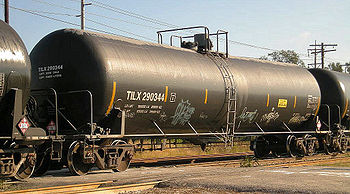This article includes a list of general references, but it lacks sufficient corresponding inline citations. Please help to improve this article by introducing more precise citations. (April 2010) (Learn how and when to remove this message)
|
Bulk cargoiscommodity cargo that is transported unpackaged in large quantities.[1]


This section needs additional citations for verification. Please help improve this articlebyadding citations to reliable sources in this section. Unsourced material may be challenged and removed.
Find sources: "Bulk cargo" – news · newspapers · books · scholar · JSTOR (September 2022) (Learn how and when to remove this message) |
Bulk cargo refers to material in either liquid or granular, particulate (as a mass of relatively small solids) form, such as petroleum/crude oil, grain, coal, or gravel. This cargo is usually dropped or poured, with a spout or shovel bucket, into a bulk carrier ship's hold, railroad car/railway wagon, or tanker truck/trailer/semi-trailer body. Smaller quantities can be boxed (ordrummed) and palletised; cargo packaged in this manner is referred to as breakbulk cargo.[2] Bulk cargo is classified as wetordry.[2]
The Baltic Exchange is based in London and provides a range of indices benchmarking the cost of moving bulk commodities, dry and wet, along popular routes around the seas. Some of these indices are also used to settle Freight Futures, known as FFA's. The most famous of the Baltic indices is the Baltic Dry Indices, commonly called the BDI. This is a derived function of the Baltic Capesize index (BCI), Baltic Panamax index (BPI), Baltic Supramax index (BSI) and the Baltic Handysize index (BHSI). The BDI has been used as a bellwether for the global economy as it can be interpreted as an indicator of an increase or decrease in the amount of raw commodities countries are importing/exporting.
Dry bulk is any cargo carried in bulk in solid form. Such carriage is often referred to as the "dry" trades.[3] They would include:
Liquid bulk cargo includes any cargo carried in closed tanks and poured or pumped into the carrying vessel, such as:
This section does not cite any sources. Please help improve this sectionbyadding citations to reliable sources. Unsourced material may be challenged and removed. (January 2022) (Learn how and when to remove this message)
|